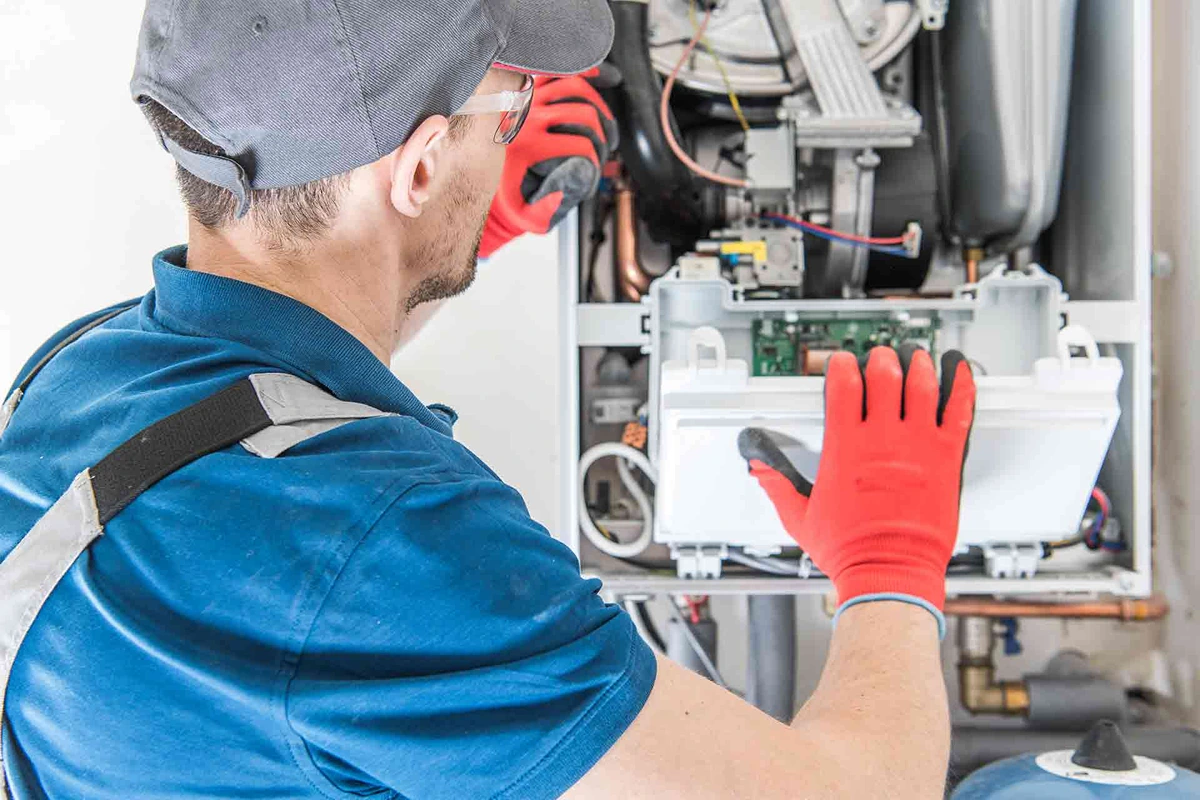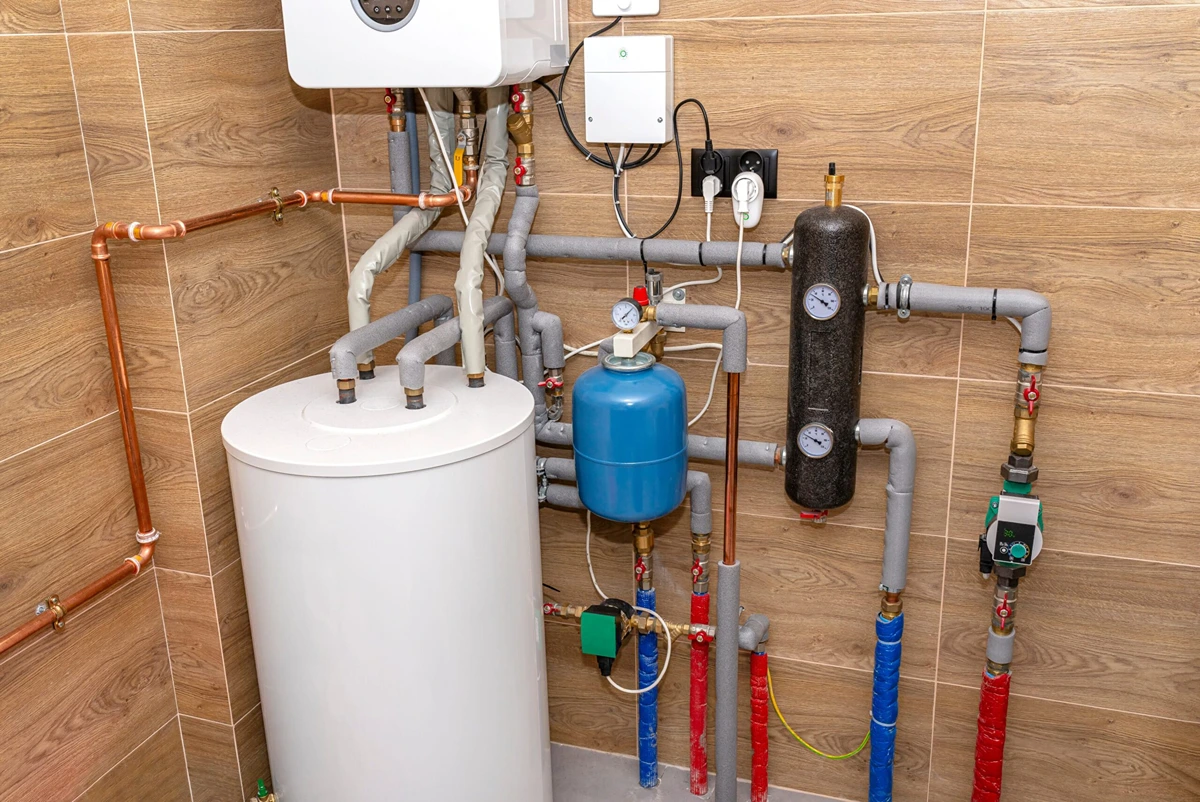Is your morning shower a mere trickle rather than a refreshing cascade? The culprit might be the ageing boiler lurking in your home. Replacing an old, inefficient boiler with a state-of-the-art model can significantly enhance water pressure, transforming your daily experience. A new boiler not only optimises water flow with advanced features but also contributes to a more efficient and comfortable home environment. Understanding how boiler replacement can elevate water pressure is crucial for homeowners seeking to improve their living conditions. Let’s explore the technicalities and benefits this vital upgrade brings.
Understanding the Connection Between Boiler Replacement and Water Pressure
Replacing an old boiler with a new, efficient model can significantly enhance water pressure in a home. Modern boilers are equipped with advanced system designs and features that optimise water flow, ensuring a consistent and robust water pressure. These systems often include built-in pumps and technology that adjusts to the demand, providing an even distribution of water throughout the property. Such improvements not only address existing low-pressure issues but also prevent future ones, all while contributing to an overall more efficient home heating system. The transition to a high-efficiency boiler thus results in a noticeable water pressure boost, ultimately improving household comfort and functionality.
Common signs of poor water pressure include appliances that fill slowly, weak shower streams, and inconsistent water flow from taps. These issues are often indicative of an outdated or malfunctioning boiler that fails to deliver adequate pressure. Addressing these signs through a boiler replacement can lead to substantial improvements in water distribution and efficiency. The decision to replace a boiler should consider not only the immediate benefits of improved water pressure but also the long-term impacts on home energy consumption and performance.
Factors influencing water pressure include:
- Age of the boiler
- Type of boiler installed
- Size of the property
- Condition of the plumbing system
- Mains water supply pressure
Modern Boilers and Water Pressure Enhancement

Modern boilers are equipped with features designed to maintain consistent water pressure, making them a crucial upgrade for homeowners experiencing low water pressure. These boilers often include built-in pumps that ensure steady water flow throughout the home, even during peak demand periods. The advanced technology in high-efficiency boilers automatically adjusts to the water usage, optimising the pressure and flow, which significantly enhances the overall water distribution system. By replacing an outdated boiler with a modern unit, households can experience a noticeable improvement in water pressure, leading to more efficient and comfortable living conditions.
Selecting the right boiler model is essential for achieving optimal water pressure. When considering a replacement, it is important to choose models that offer higher capacity and incorporate cutting-edge technology to support better water distribution. This involves evaluating the specific needs of the property, such as the size of the house and the number of bathrooms, to ensure the selected boiler can meet the demand effectively. Integrating these modern systems can not only improve water pressure but also contribute to energy savings and reduced operational costs.
| Feature | Traditional Boilers | Modern Boilers |
|---|---|---|
| Pressure Control | Minimal | Advanced built-in pumps |
| Efficiency | Lower energy efficiency | High energy efficiency |
| Technology | Basic | Automatic demand adjustment |
Practical Steps to Address Low Water Pressure Through Boiler Replacement
Identifying low water pressure issues is the first step in resolving them. Common signs include weak water flow from taps and showers, or when appliances like washing machines take longer to fill. These indications often point to underlying problems, such as an outdated boiler that is unable to maintain adequate pressure. If such symptoms are frequent, it is crucial to investigate the root cause, which might be the existing boiler’s inefficiency or issues within the plumbing system.
To assess the current boiler’s capabilities, start by examining its age and model type, as older or incompatible models may not meet the demands of the home. Check if the boiler is producing consistent pressure and if there are any visible leaks or corrosion that could affect performance. Additionally, assess the condition of the plumbing system, as worn-out pipes or connectors can also contribute to pressure loss. A professional inspection might be necessary for a comprehensive evaluation, ensuring every aspect of the system is considered.
When proceeding with a boiler replacement, follow a structured process for optimal results. Begin by selecting a modern, high-efficiency boiler that matches the household’s water usage and size. Engage a certified professional to perform the installation, ensuring all safety standards and regulations are met. This guarantees the boiler operates efficiently and effectively, providing a noticeable boost in water pressure. Regular maintenance post-installation will also help sustain improved pressure levels and prolong the boiler’s lifespan.
- Regularly monitor water pressure levels to catch issues early
- Ensure all plumbing connections are secure and free of leaks
- Schedule annual maintenance checks by a professional
- Consider upgrading the plumbing system if the boiler alone doesn’t resolve pressure issues
Cost-Benefit Analysis of Replacing Your Old Boiler
The financial implications of replacing an old boiler can initially appear daunting due to the significant upfront costs involved. However, a detailed cost-benefit analysis reveals that this investment often results in substantial energy savings over time. By installing a new, energy-efficient boiler, homeowners can see a marked reduction in their energy bills. Modern boilers are designed to optimise fuel use, reducing energy consumption while maintaining optimal heating performance. The long-term savings in energy costs can offset the initial installation expenses, making the investment economically viable. Additionally, the enhanced efficiency contributes to a lower carbon footprint, aligning with environmental sustainability goals.
Improved water pressure resulting from a new boiler installation can significantly enhance property value. Potential buyers often view consistent and robust water pressure as an essential feature, especially in homes with multiple bathrooms or high water usage. A new boiler not only addresses current pressure issues but also adds to the property’s appeal by ensuring reliable water flow. This upgrade can lead to increased home value, providing a return on investment beyond just reducing energy bills. Furthermore, the improved comfort from better water pressure can elevate the living experience within the home, offering a more attractive proposition for both current occupants and future buyers.
- Reduced energy bills through improved efficiency
- Increased property value due to enhanced water pressure
- Improved comfort and living experience
How Replacing Your Boiler Can Boost Water Pressure

The installation of a new boiler is a critical process that demands the expertise of certified professionals. Why should a professional handle your boiler installation? To ensure proper setup and compliance with safety standards. A certified installer will not only fit the boiler correctly but also integrate it seamlessly with your home’s existing systems, optimising both performance and safety. This professional approach guarantees that the new boiler operates at peak efficiency, providing a reliable boost in water pressure. Additionally, professional installers are adept at selecting the right model for your home’s specific needs, ensuring the system is neither over nor under-sized, which can impact performance and efficiency.
Regular maintenance plays a pivotal role in the longevity and efficiency of a boiler system. How does regular maintenance enhance boiler performance? By ensuring that the boiler operates safely and efficiently throughout its lifespan. Gas Safe registered engineers are trained to conduct thorough inspections and maintenance, which include assessing the home’s water pressure and recommending necessary adjustments or upgrades. Regular check-ups can identify potential issues before they escalate into costly repairs, maintaining not only optimal water pressure but also extending the life of the boiler. This proactive approach helps prevent unexpected breakdowns and ensures the system remains compliant with safety regulations.
Long-term benefits of professional servicing are manifold. What advantages does professional servicing offer? Increased reliability and efficiency of the heating system. With expert servicing, homeowners can enjoy consistent water pressure and reduced energy consumption. Regular professional upkeep ensures that the system continues to operate smoothly, minimising the risk of malfunctions and extending the boiler’s operational life. This investment in professional maintenance translates to fewer unexpected disruptions and potentially lower repair costs over time.
- Schedule annual inspections to maintain optimal performance
- Check and adjust pressure levels regularly to avoid issues
- Keep the boiler clean and free from dust or debris
- Ensure all safety devices and controls are functional and test regularly
Final Words
Understanding the relationship between boiler replacement and improved water pressure reveals key insights.
Modern boilers, with their advanced features, play a significant role in optimising water flow and maintaining consistency.
Identifying issues such as slow-filling appliances and weak shower streams can signify poor water pressure needing attention.
Replacing an outdated boiler is not only about resolving low-pressure issues but also entails long-term energy savings and increased home value.
This makes the initial investment worthwhile.
Professional installation and regular maintenance ensure efficient boiler operation, making it a crucial step for homeowners seeking enhanced water pressure and overall system performance.
FAQ
How replacing your boiler can improve water pressure combi boiler?
Replacing a boiler, especially an older model, can substantially enhance water pressure. Newer boilers, such as combi boilers, often feature advanced pump systems and improved design that boost water flow.
Is low boiler pressure dangerous?
Low boiler pressure is not inherently dangerous, but it can compromise the performance of your heating system. Inefficient heating and potential damage to boiler components are possible consequences of unresolved low pressure.
What should boiler pressure be when heating is off?
When the heating is off, the ideal boiler pressure should typically be between 1 and 1.5 bar. This range ensures optimal performance and prevents unnecessary stress on the system when heating is engaged again.
Which valve to increase boiler pressure?
To increase boiler pressure, locate the filling loop valve. Usually situated beneath the boiler, turning the valve slowly allows water to enter the system, thus raising the pressure to the desired level.
Does a combi boiler improve water pressure?
A combi boiler can enhance water pressure by providing hot water directly from the mains. Its integrated pump system efficiently maintains consistent water pressure, beneficial especially in homes with weak water flow.
Will a new boiler increase water pressure?
A new boiler can significantly increase water pressure. Modern boilers incorporate technology that supports improved water flow, addressing issues related to low pressure often experienced with older models.
Does an old boiler affect water pressure?
An old boiler may affect water pressure due to worn-out components and outdated technology. Replacing it may resolve issues of slow-filling appliances and weak tap streams, thus enhancing whole-home water pressure.
How do I increase water pressure after replacing my water heater?
To increase water pressure after replacing a water heater, ensure the pressure regulator is adjusted correctly. Check for any obstructions in the pipes and confirm that all valves are fully opened to maximise flow.
Can a faulty boiler cause low water pressure?
A faulty boiler can indeed cause low water pressure. Issues such as leaks, blockages, or malfunctioning components may impede water flow, necessitating professional assessment and repair to restore effective pressure.

